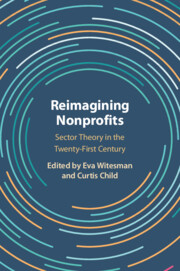Book contents
- Reimagining Nonprofits
- Reimagining Nonprofits
- Copyright page
- Contents
- Figures
- Tables
- Contributors
- Acknowledgments
- 1 An Invitation to Rethink the Nonprofit Sector
- Part I Overviews
- Part II Reflections and Refinements
- Part III New Directions
- 12 Nonprofits as Organizational Actors
- 13 Nonprofits as Enablers of Multilayered Representation
- 14 Nonprofits as Facilitators of National Self-development
- 15 Nonprofits as Part of an Engineered Social Economy
- 16 Nonprofits as Shaped by the Ruling Party
- 17 Nonprofits as Sources of Authoritarian Regime Stability
- 18 Nonprofits as Creators of Transformative Symbolic Reality
- 19 Nonprofits as Distributors of Toll Goods
- 20 Nonprofits as Agents of Moral Authority
- Part IV Conclusion
- Index
- References
18 - Nonprofits as Creators of Transformative Symbolic Reality
from Part III - New Directions
Published online by Cambridge University Press: 11 January 2024
- Reimagining Nonprofits
- Reimagining Nonprofits
- Copyright page
- Contents
- Figures
- Tables
- Contributors
- Acknowledgments
- 1 An Invitation to Rethink the Nonprofit Sector
- Part I Overviews
- Part II Reflections and Refinements
- Part III New Directions
- 12 Nonprofits as Organizational Actors
- 13 Nonprofits as Enablers of Multilayered Representation
- 14 Nonprofits as Facilitators of National Self-development
- 15 Nonprofits as Part of an Engineered Social Economy
- 16 Nonprofits as Shaped by the Ruling Party
- 17 Nonprofits as Sources of Authoritarian Regime Stability
- 18 Nonprofits as Creators of Transformative Symbolic Reality
- 19 Nonprofits as Distributors of Toll Goods
- 20 Nonprofits as Agents of Moral Authority
- Part IV Conclusion
- Index
- References
Summary
Ressler introduces a sociological theory of transformative symbolic reality to illuminate a specific, but often overlooked, impact of the nonprofit sector that is directly tied to improving the quality of life for individuals and groups within society. Grounded in the sociology of communities and nonprofit theory, transformative symbolic reality states that society reproduces itself or changes through social reality, and that social reality can be purposefully manipulated to challenge the forces of inequity. Specifically, individuals or organizations can create both the physical and metaphysical spaces in which people manifest and manipulate social norms, expectations, and behaviors in an inter-relational way that generates transformative social capital. Through the lens of transformative symbolic reality, the chapter conceptualizes the nonprofit sector as a wellspring of this overlooked public good and argues that it is this transformative aspect of the nonprofit sector that undergirds connections between nonprofit organizations and any long-term social impact.
Keywords
- Type
- Chapter
- Information
- Reimagining NonprofitsSector Theory in the Twenty-First Century, pp. 353 - 371Publisher: Cambridge University PressPrint publication year: 2024

